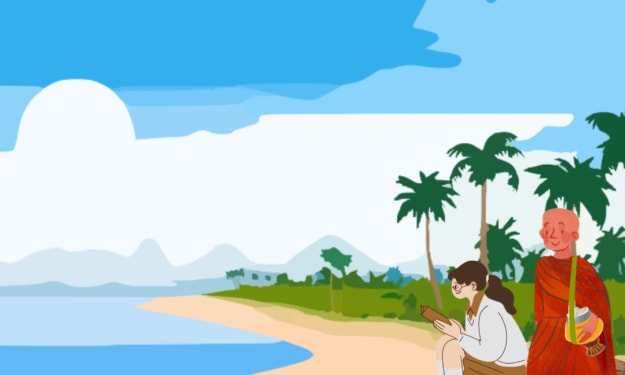Unseen Scars
A Journey of Resilience and Redemption

Once upon a time, in a bustling city, lived Mei-Ling, a young Asian Pacific American woman with dreams as vibrant as the city lights. Mei-Ling's childhood was filled with innocence, laughter, and a sense of wonder for the world. But as she grew older, the harsh reality of racism and discrimination shattered the blissful bubble she once lived in.
At school, Mei-Ling began to feel the piercing gaze of her classmates, their whispers like daggers cutting through her fragile self-esteem. The slurs and mocking remarks about her heritage struck deep, leaving her feeling ashamed of her own identity. She yearned to fit in, to be seen as equal, but the barriers of prejudice seemed insurmountable.
As Mei-Ling entered adulthood, subtle forms of discrimination continued to plague her path. In professional settings, she faced the glass ceiling, invisible but present, holding her back from achieving her true potential. She watched as others were promoted ahead of her, their accomplishments seemingly overshadowing her own.
The constant battle within Mei-Ling's mind gnawed at her soul. She questioned her worth, wondering if her dreams were nothing more than illusions. Each day, she wore a brave face, but beneath the surface, she carried the weight of rejection, silently fighting against the doubt that threatened to consume her.
Amid Mei-Ling's struggles, her family became a beacon of love and support. They had faced their battles against discrimination and racism, and their unwavering encouragement became her guiding light. They reminded her of her inherent worth, her unique perspective, and the strength that lay within her heritage.
Together, they created a sanctuary within their home—a place where culture, tradition, and love intertwined. Mei-Ling's family instilled in her a sense of pride, teaching her about the rich tapestry of her Asian-Pacific American heritage. She learned to celebrate her roots, to embrace the beauty of her identity, and to rise above the ignorance of others.
One fateful day, Mei-Ling stumbled upon an organization dedicated to combating racism and promoting inclusivity. Drawn to their mission, she mustered the courage to attend one of their meetings. To her surprise, she found a room filled with individuals from various backgrounds, all united in their desire for change.
In that space, Mei-Ling's voice found resonance. She shared her experiences of discrimination, her struggles, and the scars that had formed within her. As she spoke, the room fell into a hushed silence, her words touching the hearts of those present. It was a moment of collective awakening, a realization that the fight against racism required unity and collective action.
Empowered by the support of the organization and the newfound strength within herself, Mei-Ling embraced her role as an activist. She began sharing her story, both within the organization and in broader communities. Her voice echoed through public forums, social media platforms, and intimate conversations, raising awareness about the lasting impact of racism and discrimination.
As Mei-Ling's activism grew, so did the seeds of change. People began to question their own biases, engage in difficult conversations, and challenge societal norms. Mei-Ling's journey became intertwined with the stories of countless others who had faced similar struggles, forging bonds of solidarity and empathy.
Through her efforts, Mei-Ling discovered the power of collective healing. She saw the transformation that came from sharing pain, validating experiences, and uplifting each other's voices. The scars that once seemed unhealable slowly began to fade as she realized that her voice mattered and that her experiences were not in vain.
Mei-Ling's journey was not without setbacks. There were moments when she faced resistance, encountered backlash, and felt overwhelmed by the enormity of the task ahead. But she refused to be silenced. Each setback only fueled her determination to create a world where no one would have to endure the pain she once did.
With unwavering resolve, Mei-Ling collaborated with like-minded individuals and organizations, forming alliances that amplified their collective voices. They organized rallies, marches, and community events to raise awareness about the impact of racism and discrimination on Asian Pacific Americans and other marginalized communities.
As Mei-Ling and her allies continued to fight, they witnessed a gradual shift in society. Conversations about racial equality became more widespread, leading to policy changes and institutional reforms. Mei-Ling's voice was no longer just a whisper in the wind; it had become a resounding call for justice and equality.
But amidst the progress, Mei-Ling never forgot the emotional toll racism and discrimination had taken on her and others. She dedicated herself to providing support and resources for those who had been deeply scarred by their experiences. She initiated mentorship programs, counseling services, and safe spaces for individuals to heal and rebuild their sense of self-worth.
In time, Mei-Ling's story reached far beyond her immediate community. Through media coverage and her growing online presence, her message resonated with individuals from all walks of life. People from different backgrounds started to empathize with the pain of discrimination and recognized the importance of standing up against injustice.
The impact of Mei-Ling's activism extended beyond her lifetime. Her dedication inspired a new generation of Asian-Pacific American leaders, activists, and change-makers. They carried her torch, continuing the fight for racial equality, and forging paths towards a more inclusive society.
As the years passed, Mei-Ling witnessed a gradual shift in societal attitudes. People became more aware of their biases, actively challenging stereotypes, and embracing cultural diversity. The scars of discrimination that once seemed so prevalent began to fade, replaced by a society that valued and celebrated the richness of every individual's heritage.
Mei-Ling's journey was not without its challenges, but she persevered with unwavering resilience, turning her unseen scars into a source of strength and empowerment. Through her advocacy and the power of community, she helped create a world where Asian-Pacific Americans and individuals from all backgrounds could live with dignity, equality, and a sense of belonging.
And so, Mei-Ling's story stands as a testament to the indomitable human spirit, reminding us that even in the face of adversity, change is possible. It is a call to action, urging each of us to recognize the unseen scars that others may carry, to empathize with their experiences, and to work together to build a society rooted in compassion, understanding, and equal opportunity for all.
About the Creator
Enjoyed the story? Support the Creator.
Subscribe for free to receive all their stories in your feed. You could also pledge your support or give them a one-off tip, letting them know you appreciate their work.





Comments
There are no comments for this story
Be the first to respond and start the conversation.